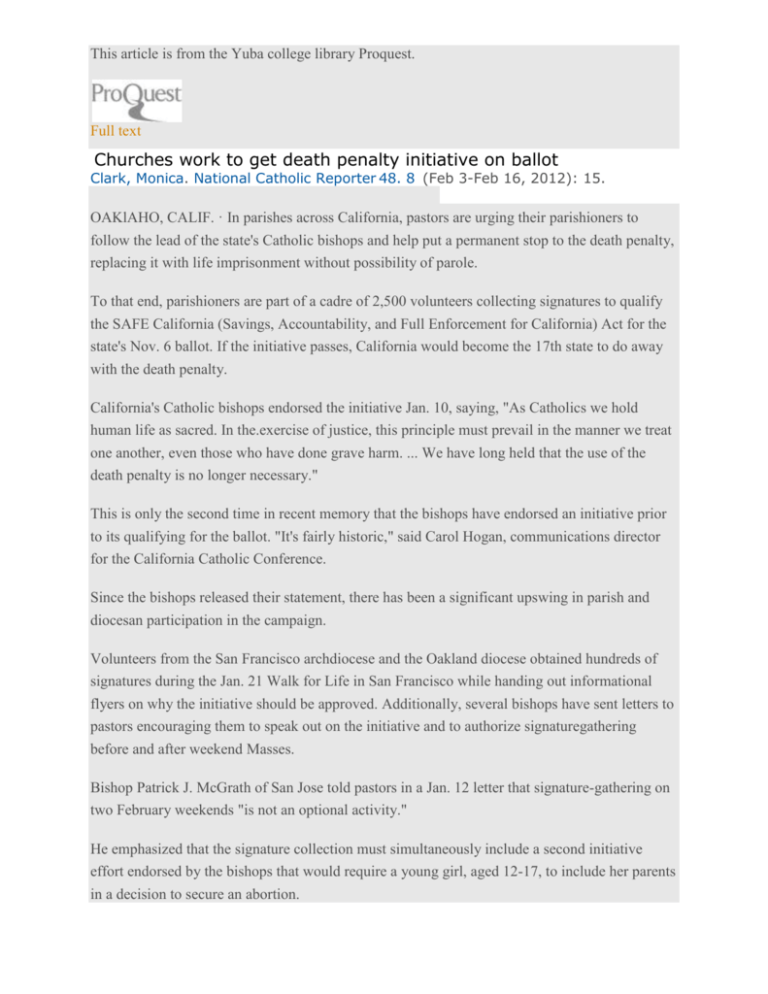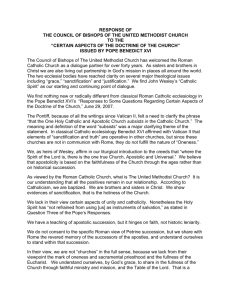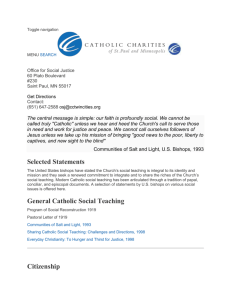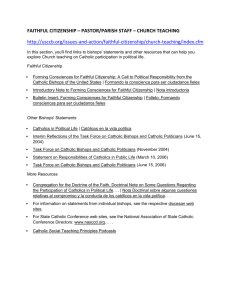
This article is from the Yuba college library Proquest.
Full text
Churches work to get death penalty initiative on ballot
Clark, Monica. National Catholic Reporter 48. 8 (Feb 3-Feb 16, 2012): 15.
OAKlAHO, CALIF. · In parishes across California, pastors are urging their parishioners to
follow the lead of the state's Catholic bishops and help put a permanent stop to the death penalty,
replacing it with life imprisonment without possibility of parole.
To that end, parishioners are part of a cadre of 2,500 volunteers collecting signatures to qualify
the SAFE California (Savings, Accountability, and Full Enforcement for California) Act for the
state's Nov. 6 ballot. If the initiative passes, California would become the 17th state to do away
with the death penalty.
California's Catholic bishops endorsed the initiative Jan. 10, saying, "As Catholics we hold
human life as sacred. In the.exercise of justice, this principle must prevail in the manner we treat
one another, even those who have done grave harm. ... We have long held that the use of the
death penalty is no longer necessary."
This is only the second time in recent memory that the bishops have endorsed an initiative prior
to its qualifying for the ballot. "It's fairly historic," said Carol Hogan, communications director
for the California Catholic Conference.
Since the bishops released their statement, there has been a significant upswing in parish and
diocesan participation in the campaign.
Volunteers from the San Francisco archdiocese and the Oakland diocese obtained hundreds of
signatures during the Jan. 21 Walk for Life in San Francisco while handing out informational
flyers on why the initiative should be approved. Additionally, several bishops have sent letters to
pastors encouraging them to speak out on the initiative and to authorize signaturegathering
before and after weekend Masses.
Bishop Patrick J. McGrath of San Jose told pastors in a Jan. 12 letter that signature-gathering on
two February weekends "is not an optional activity."
He emphasized that the signature collection must simultaneously include a second initiative
effort endorsed by the bishops that would require a young girl, aged 12-17, to include her parents
in a decision to secure an abortion.
Addressing the link between the two initiatives, Bishop Gerald Barnes of San Bernardino
emphasized "the common thread that runs through them - our belief as Roman Catholics that
every human life is sacred, be it unborn or the criminal."
Catherine Huston, coordinator of the Catholic Campaign to End Use of the Death Penalty for the
San Francisco archdiocese, sees the effort as "the chance for us to live old? faith. We don't kill
people to teach people killing is wrong."
Huston, who with her husband and son has gathered more than 1,000 signatures, rode the
Freedom Train from her Burlingame home to San Francisco for the Martin Luther King
celebration Jan. 16. On the train and at the rally she collected signatures, finding very few who
didn't want to sign. But, she said, this effort is just the first step in a longer campaign to educate
citizens through a "deeper conversation" about why capital punishment must be eliminated.
As the Catholic representative to the California People of Faith Working against the Death
Penalty coalition, Huston is helping steer the 1000 Congregations Campaign to get churches
engaged in education and dialogue about the death penalty.
She sees the bishops' most recent statement as a challenge to lay Catholics. "We can make a
powerful difference," she said. "The bishops have not changed their stance [against capital
punishment] for the past 30 years. Now it is up to the laity to act on this."
A June 2011 study by former death penalty prosecutor and federal Judge Arthur Alarcon and law
professor Paula Mitchell showed that California has spent $4 billion on the death penalty since it
was reinstated in 1978. During that time, the state executed 13 people at a cost of $308 million
per execution.
By abolishing the death penalty, supporters say, the state can use the savings for additional
police to solve the 56 percent of unsolved rape and 46 percent of unsolved murder cases.
Additionally, money will be available to develop better crime prevention.
To ensure that the funds are used for these efforts, the initiative requires that for three years the
approximately $30 million in annual budget savings be put into the SAFE California Fund to
investigate current rape and murder cases. It also specifies that convicted murderers must work
to pay restitution into a victims' compensation fund.
California Chief Justice Tani CantilSakauye told the Los Angeles Times in December that the
death penalty is no longer effective in California and requires "structural change." The state
doesn't have the money "to create the kind of change that is needed," she said. "Everyone is
laboring under a staggering load."
Currently more than 700 convicted felons are on California's death row, the highest in the nation.
If voters approve the SAFE California initiative, those sentences would be converted to life
imprisonment without parole.
The SAFE California campaign is sponsored by Taxpayers for Public Safety, a coalition of faith,
civil rights and legal groups as well as the families of murder victims, people exonerated after
wrongful conviction, and members of law enforcement. Organizers estimate it will cost $1.5
million to qualify the initiative for the ballot. Supporters have made donations ranging from $5 to
$500,000, according to Miriam Gerace, a campaign spokesperson. Hogan, the bishops'
communications director, said the California Catholic Conference will not be a financial
contributor.
Endorsers of SAFE California include the Dominican Sisters of Mission San Jose, the California
Province of the Society of Jesus, the Office of Social Ministry of the San Diego diocese,
JustFaith Ministries, and Pax Christi USA.
Sidebar
Death penalty
Costs for California since 1 978
$1.94 billion
Death penalty pretrial and tried costs
$925 million
Automatic appeals and state habeas corpus petitions
$775 million
Federal habeas corpus petitions
$1 billion
Costs of death row incarceration
Source: "Executing the Will of the Voters?" Alarcon and Michael, June 2011
AuthorAffiliation
[Monica Clark is an NCR West Coast correspondent. Her email address is
mclark@ncronline.org.]
Copyright National Catholic Reporter Publishing Company Feb 3-Feb 16, 2012
Word count: 979
Indexing (details)
Cite
Subject
Rape;
Signatures;
Capital punishment;
Initiatives;
Cost control
Title
Churches work to get death penalty initiative on ballot
Author
Clark, Monica
Publication title
National Catholic Reporter
Volume
48
Issue
8
Pages
15
Number of pages
1
Publication year
2012
Publication date
Feb 3-Feb 16, 2012
Year
2012
Section
NATION
Publisher
Kansas City
Publisher
National Catholic Reporter Publishing Company
Place of publication
Kansas City
Country of publication
United States
Journal subject
Religions And Theology--Roman Catholic
ISSN
00278939
CODEN
NLCRBC
Source type
Trade Journals
Language of publication
English
Document type
Feature
Document feature
Illustrations
Subfile
Capital punishment, Signatures, Cost control, Initiatives, Rape
ProQuest document ID
921024084
Document URL
http://search.proquest.com/docview/921024084?accountid=15185
Copyright
Copyright National Catholic Reporter Publishing Company Feb 3-Feb 16, 2012
Last updated
2012-02-11
Database
ProQuest Research Library
Copyright © 2012 ProQuest LLC. All rights reserved. Terms and Conditions
The Yuba College library has many more excellent online and print resources with librarians to
help you find information from any type of resource.









